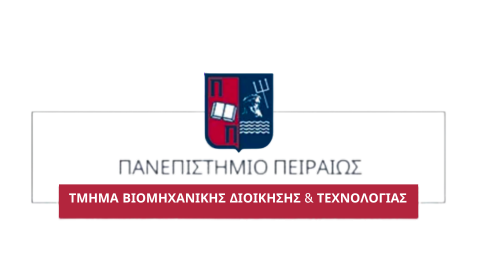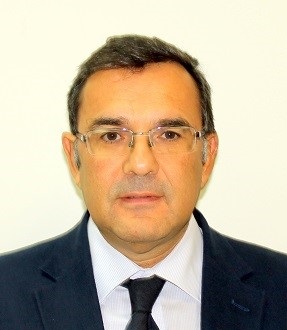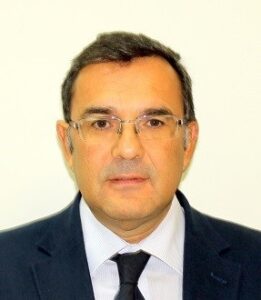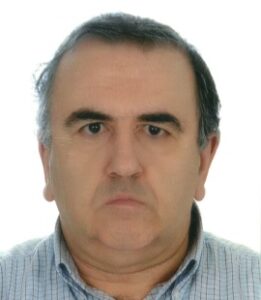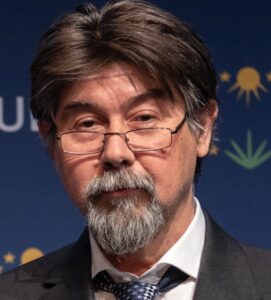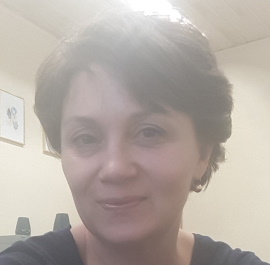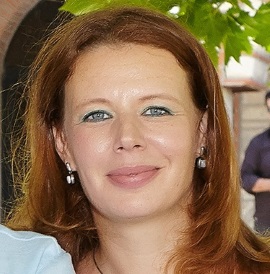Department of Industrial Management & Technology
27 January 2024 2024-01-28 17:19Department of Industrial Management & Technology
Stay informed about the Department’s news:
Contact Information:
Address: 80 Karaoli & Dimitriou Str., 185 34, Piraeus
Email: tex-secr@unipi.gr
Phone: +30 210 414-2094, -2098, -2095
MESSAGE FROM THE DEPARTMENT CHAIR
Dear Students,
We welcome you to the Department of Industrial Management & Technology (DIMT) and congratulate you on your success. Our Department began its operation in 1991. It is the genuine successor of the “School of Industrial Studies” that was founded back in 1938, evolved to the “Higher Industrial School of Piraeus” in 1958, and was finally renamed as the “University of Piraeus” in 1989.
The DIMT is a dynamic, evolving cell of the University of Piraeus, with goals, vision and a promising future. Its distinctive advantage – and at the same time its added value – is that it combines management science with the technological component in the field of industrial enterprise, thus differentiating it from general business administration studies. Let’s try to understand what this actually means.
Every day we all use products and goods that have been produced through industrial processes and procedures. But what does industrial production involve? Questions like how a product is designed, how do we choose the materials to use, what equipment to choose and how to put it into operation, how to plan our production using available resources in an optimal manner, how to manage our supplies and how we organize our distributions, how we set our strategy in the face of competition, how we manage and motivate our executives, how we leverage our information and how we analyze our business data, how we manage energy and environmental challenges, how we make business decisions under uncertainty, how we set up reliable and quality production units, etc., are required on a daily basis in an industrial enterprise so that we can enjoy various innovative and sustainable products.
In your undergraduate studies at DIMT you will have the opportunity to learn and practice the methods that provide us with answers to these (and many more) questions and use modern software tools to support your decisions, implement strategies and solve problems that require knowledge and skills in the contemporary, technologically advanced industry. But above all, you will develop a broad and critical way of thinking and discover the challenges and the fascination of combining technological and managerial knowledge, which shape both the modern scientist and the successful business executive.
Our Department, as well as our University in general, will be by your side at every step of this path, providing you with knowledge and opportunities and opening windows for you to discover attractive areas of interest.
From your side, you should be consistent, operate with academic principles, make every day count and always evolve.
I wish you all have a creative academic year!
Professor Dimitrios Emiris
Department Chair
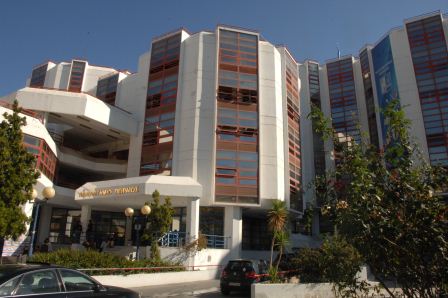
The DIMT is a dynamic, evolving cell of the University of Piraeus, with goals, vision and a promising future. Its distinctive advantage – and at the same time its added value – is that it combines management science with the technological component in the field of industrial enterprise, thus differentiating it from general business administration studies.
The aim of the Department, with its modern curriculum, is to provide students with the knowledge of the scientific methodology required for the analysis, design, implementation and organization of appropriate systems, in order to effectively address the complex problems that arise in the production process from the interdependence of human factor, raw materials, means of production and modern technology.
The introduction of new technologies (automated production and distribution equipment, information networks, new materials and processes, support / decision making systems, etc.) as well as ensuring the sustainability and competitiveness of the business in today’s complex economic and technological environment, require firm foundations and knowledge in the management of industrial enterprises.
Course Guide of the Department of Industrial Management and Technology
Postgraduate Studies
The Master’s Program of the Department, the MSc in Industrial Management and Technology, consists of three contemporary specializations, “Logistics Management“, “Energy and Environmental Management” and “Project Management“. Logistics, Energy Management and Project Management are undoubtedly critical activities in the contemporary work and economic environment, both in Greece and internationally. In this context, there is an urgent need to train professionals in the above sectors, capable of responding to the challenges and needs of the modern business world.
The MSc in “Industrial Management and Technology” of the University of Piraeus aspires to provide high level staff for private and public sector companies. This is supported by its contemporary curriculum that focuses on high priority directions for our country and internationally (Logistics Management, Energy & Environmental Management, Project Management), as well as the academic staff with distinctions in their field, publications in the best international journals and high quality research. At the same time, an integral part of the learning experience of the students of the Program is a variety of activities such as seminars, workshops, conferences, study trips, simulation exercises, company visits that add special value.
You can find more information on the MSc in Industrial Management and Technology in its website (here) and the website of the Department (here).
Moreover, the Department offers the opportunity for Doctorate Studies and hence acquiring a PhD (see details here).
Job Market
The Department of Industrial Management and Technology provides a high-level academic experience that promotes the acquisition of knowledge, abilities and skills by placing particular emphasis on the effective and innovative management of the operations and challenges of industrial management and production, on technology management, on problem solving, on the development of initiative, entrepreneurship, teamwork and scientific critical ability in order to ensure the successful professional career of the Department’s graduates in the private and/or public sector.
For this purpose, a successful internship program has been designed and implemented with the participation of a large number of Greek and multinational companies, while at the same time a number of other related activities are carried out, such as visits to companies, participation in career days, seminars and lectures by senior executives, networking with important professional bodies and integrating into the curriculum the learning of quantitative tools and information systems as well as the development of professional skills.
Graduates of the Department can meet a wide range of needs of modern businesses, industries and organizations. As they enter the labor market, they enjoy the reputation of a good university, as seen through international evaluations but above all by the excellent image created by the graduates of previous years who are active in various sectors of industry and economy.
Research
The quality of the research conducted within the Department is reflected in the number of scientific journals in which it is published, in the scientific training and expertise of the faculty members, in the participation of dedicated and capable Doctoral candidates and Postdoctoral researchers, as well as in the research activities that take place in the Department.
In the context of its research activities, the Department supports: (a) the promotion of modern scientific and technological trends, (b) interdisciplinarity and cooperation with other research bodies, (c) the better education of undergraduate and postgraduate students and (d) strengthening its connection with industry and the business environment.
Undergraduate Studies
The Department of Industrial Management and Technology provides a high-level academic experience that promotes the acquisition of knowledge, abilities and skills by placing particular emphasis on the effective and innovative management of the operations and challenges of industrial management and production, on technology management, on problem solving, on the development of initiative, entrepreneurship, teamwork and scientific critical ability in order to ensure the successful professional career of the Department’s graduates in the private and/or public sector.
The Undergraduate Program covers all business functions with an emphasis on the industrial sector. The structure of the program harmoniously synthesizes the administrative, economic and technological dimensions of a complex system such as the industrial unit, so that the graduates of the Department are able to successfully deal with the complex administrative and economic-technical problems, which they will frequently face in their career.
You can see the Undergraduate Program of the Department in detail here.
The Department offers a four-year Undergraduate Program which corresponds to 240 ECTS credits and awards, upon successful completion, a Bachelor’s Degree in “Industrial Management and Technology”.
Postgraduate Studies
The Department of Industrial Management and Technology offers the MSc in Industrial Management and Technology which awards a Master’s Degree corresponding to 90 ECTS credits.
The MSc of the Department includes three specializations:
- Logistics Management: The goal of this specialization is to provide the required specialized knowledge and personal skills for a successful professional career in the Product Handling and Distribution industry. The above objective is achieved through a modern curriculum, which combines the study of established techniques and approaches from the field of Supply Chain Management with the study of topics related to recent technological and scientific developments, such as sustainable supply management, data analysis techniques, and new production, storage and distribution technologies. More info here – Program study of the Logistics Management specialization here.
- Energy and Environmental Management: Addressing contemporary challenges related to environmental protection, energy management and sustainable management requires an interdisciplinary approach that takes into account all relevant technical, organizational, economic and social parameters. The goal of the “Energy & Environment Management” specialization is to transfer all the knowledge, practices and methodological tools required for the holistic study of the above topics and the adaptation of businesses/organizations to the modern framework of the Circular Economy and Sustainable Development. More info here – Program study of the Energy and Environmental Management specialization here.
- Project Management: The objective of this specialization is to provide the knowledge and skills required for the effective management of a project, from the initial stages of planning and programming to its successful completion. The curriculum combines qualitative issues and real-life cases with technical and quantitative approaches, and is structured in a way that allows students from different academic backgrounds to benefit from attending it. Particular emphasis is placed on the development of personal skills related to participation and cooperation in teams, skills which are necessary to bring together different knowledge, approaches and practices and to effectively manage complex projects. More info here – Program study of the Project Management specialization here.
More info on the MSc in Industrial Management and Technology can be found in the Master’s website (here) and in the website of the Department (here)
Doctoral Studies
Doctoral Studies aim to create high quality scientific research as well as to shape scientists capable of contributing to the advancement of research and applications of science. The Doctoral Program prepares graduates to be engaged in research, entrepreneurship and education in Greece and abroad.
In parallel, the Doctoral Program is a source of academic prestige and international recognition for the Department and contributes to the upgrading of research, with an emphasis on the scientific work relevant to its field of expertise. The third-level course includes the preparation of a Doctoral Thesis and concludes with the award of a Ph.D.
Teaching & Research Personnel
Professors
Associate Professors
Assistant Professors
Assistant Professors
EMERITUS PROFESSORS

Teaching Staff

Remaining Teaching Staff

Administrative Personnel
Laboratory of Advanced Manufacturing Technologies & Testing
Laboratory of Simulation of Industrial Processes
Laboratory of Production Management Information Systems
Laboratory of Technoeconomics of Energy Systems
Laboratory of Innovative and Sustainable Supply Chain Management
Management and Economics of Industry Laboratory
Research Policy
The research policy of the Department is related to its objectives and determined by the research activity of the faculty members. For this purpose, the Department has established and operates six Laboratories, which, alongside basic and applied research activities, also serve the educational needs of the undergraduate and postgraduate courses.
In the context of its research activities, the Department supports: (a) the promotion of modern scientific and technological trends, (b) interdisciplinarity and cooperation with other research bodies, (c) the better education of undergraduate and postgraduate students and (d) strengthening its connection with industry and the business environment.
The Department’s research activities cover a relatively wide range of research areas such as:
- Industrial systems techniques, including computational techniques and rapid product development methods
- Robotic production systems and automatic control
- Mathematical programming in production
- Materials technology – industrial applications, design & development of new products
- Advanced product manufacturing technologies and computerized design and production systems
- Design of chemical technology and biotechnology products
- Industrial processes and natural resource management
- Information technology, information systems and soft computing techniques
- Product handling & distribution systems and procurement management
- Technoeconomics of energy systems
- Corporate strategy
- Financial management
Particular emphasis has been placed in recent years on the promotion of research in modern fields such as:
- Product design & development: additive manufacturing technologies, eco-design, engineering analysis of advanced materials/fabrications, digital modeling/prototyping
- Nanotechnology: nanostructured materials and nanodevices, their production and prototyping, construction of three-dimensional medical microstructures
- Advanced energy systems and energy management: techno-economic analysis, climate change and sustainability, energy market mechanisms, smart grids
- Environmental management: advanced environmental protection systems, environmental monitoring networks, environmental impact assessment, natural resource management, recycling, waste recovery
- Project management: intelligent scheduling and resource allocation techniques with constraints, project risk management
- Robotics and mechatronics: robotic vision and navigation of autonomous systems, dynamic properties of optimal geometries of articulated robots, human modeling for computer locomotion
- Logistics: ERP systems, green logistics, digital supply chain transformation, smart digital chains, sustainable logistics, humanitarian supply chain
- Production systems: application of analytical methods in industry to identify/anticipate disruptions in production and support decisions to address them
- Decision support systems: fuzzy networks, neural networks, data security
- Corporate strategy and management: ambidextrous strategies in rapidly changing industries, knowledge management and innovation development strategies, team performance and dynamics, multi-level analysis models.
- Corporate finance: investments, energy and environmental finance, investment evaluation
Indicative publications in scientific journals over the period 2018 – 2023
2023
- Bozionelos, N., Mukhuty, S., Kostopoulos, K.C., Bozionelos, G. and Blenkinsopp, J., 2023. Civilian volunteers in United Nations hot spots: what makes them intend to apply for yet another mission?. The International Journal of Human Resource Management, 34(12), pp.2516-2545.
- Gennitsaris, S., Oliveira, M.C., Vris, G., Bofilios, A., Ntinou, T., Frutuoso, A.R., Queiroga, C., Giannatsis, J., Sofianopoulou, S. and Dedoussis, V., 2023. Energy Efficiency Management in Small and Medium-Sized Enterprises: Current Situation, Case Studies and Best Practices. Sustainability, 15(4), p.3727.
- Karna, M., Kakalis, C., Chatzidai, N., Kousiatza, C., Tambouratzis, T. and Karalekas, D., 2023. A combined experimental and artificial neural networks study of distortion in 3D printed beam specimens. Materials Today: Proceedings.
- Keil, T., Syrigos, E., Kostopoulos, K.C., D. Meissner, F. and G. Audia, P., 2023. (In) Consistent Performance Feedback and the Locus of Search. Journal of Management, p.01492063231185519.
- Klossa, C.M., Chatzidai, N. and Karalekas, D., 2023. Tensile properties of 3D printed carbon fiber reinforced nylon specimens. Materials Today: Proceedings.
- Kostopoulos, K., Syrigos, E. and Kuusela, P., 2023. Responding to inconsistent performance feedback on multiple goals: the contingency role of decision maker’s status in introducing changes. Long Range Planning, 56(1), p.102269.
- Michas, S. and Flamos, A., 2023. Are there preferable capacity combinations of renewables and storage? Exploratory quantifications along various technology deployment pathways. Energy Policy, 174, p.113455.
- Orfanidou, V.S., Rachaniotis, N.P., Tsoulfas, G.T. and Chondrokoukis, G.P., 2023. Life Cycle Costing Implementation in Green Public Procurement: A Case Study from the Greek Public Sector. Sustainability, 15(3), p.2817.
- Papachristos, V., Antonopoulos, C., Rachaniotis, N.P., Spontas, D. and Dasaklis, T.K., 2023. The Potential of ICT Adoption in Promoting Sustainable and Resilient Supply Chains: Evidence from Greek Logistics Firms. Sustainability, 15(22), p.15854.
- Pietrapertosa, F., Olazabal, M., Simoes, S.G., Salvia, M., Fokaides, P.A., Ioannou, B.I., Viguié, V., Spyridaki, N.A., Hurtado, S.D.G., Geneletti, D. and Heidrich, O., 2023. Adaptation to climate change in cities of Mediterranean Europe. Cities, 140, p.104452.
- Psychoyios, D., 2023. Income growth, forecasting and stock valuation. IMA Journal of Management Mathematics, p.dpad018.
- Reckien, D., Buzasi, A., Olazabal, M., Spyridaki, N.A., Eckersley, P., Simoes, S.G., Salvia, M., Pietrapertosa, F., Fokaides, P., Goonesekera, S.M. and Tardieu, L., 2023. Quality of urban climate adaptation plans over time. npj Urban Sustainability, 3(1), p.13.
- Tzani, D., Exintaveloni, D.S., Stavrakas, V. and Flamos, A., 2023. Devising policy strategies for the deployment of energy efficiency Pay-for-Performance programmes in the European Union. Energy Policy, 178, p.113593.
2022
Bilalis, L., Canellidis, V., Papatheodorou, T. and Giannatsis, J., 2022. Direct Digital Manufacturing of a Customized Face Mask. Journal of Manufacturing and Materials Processing, 6(5), p.126.
Bozionelos, N., Mukhuty, S., Kostopoulos, K.C., Bozionelos, G. and Blenkinsopp, J., 2022. Civilian volunteers in United Nations hot spots: what makes them intend to apply for yet another mission?. The International Journal of Human Resource Management, pp.1-30.
Eirinakis, P. and Koronakos, G., 2022. A mathematical programming approach for optimizing on-specs production for industrial processes under input uncertainty. IFAC-PapersOnLine, 55(10), pp.2822-2827.
Eirinakis, P., Lounis, S., Plitsos, S., Arampatzis, G., Kalaboukas, K., Kenda, K., Lu, J., Rožanec, J.M. and Stojanovic, N., 2022. Cognitive Digital Twins for Resilience in Production: A Conceptual Framework. Information, 13(1), p.33.
Eirinakis, P., Mourtos, I. and Zampou, E., 2022. Random Serial Dictatorship for horizontal collaboration in logistics. Omega, 111, p.102662.
Kitsou, S.P., Koutsoukis, N.S., Chountalas, P. and Rachaniotis, N.P., 2022. International Passenger Traffic at the Hellenic Airports: Impact of the COVID-19 Pandemic and Mid-Term Forecasting. Aerospace, 9(3), p.143.
Kostopoulos, K., Syrigos, E. and Kuusela, P., 2022. Responding to Inconsistent Performance Feedback on Multiple Goals: The Contingency Role of Decision Maker’s Status in Introducing Changes. Long Range Planning, p.102269.
Rachaniotis, N.P., 2022. Evaluating the COVID-19 Containment Protocol in Greek Universities for the Academic Year 2021–2022. International Journal of Environmental Research and Public Health, 19(21), p.14363.
Rachaniotis, N.P., Dasaklis, T.K., Fotopoulos, F., Chouzouris, M., Sypsa, V., Lyberaki, A. and Tinios, P., 2022. Is mandatory vaccination in population over 60 adequate to control the COVID-19 pandemic in EU?. Vaccines, 10(2), p.329.
Spyrou-Sioula, K., Kontopoulos, I., Kaklis, D., Makris, A., Tserpes, K., Eirinakis, P. and Oikonomou, F., 2022. AIS-Enabled Weather Routing for Cargo Loss Prevention. Journal of Marine Science and Engineering, 10(11), p.1755.
2021
Denekos, S.N., Koutsoukis, N.S., Fakiolas, E.T., Konstantopoulos, I. and Rachaniotis, N.P., 2021. Siting refugee camps in mainland Greece using geographic information systems-based multi-criteria decision-making. Journal of Humanitarian Logistics and Supply Chain Management, 11(3), pp.457-480.
Eirinakis, P., Kasapidis, G., Mourtos, I., Repoussis, P. and Zampou, E., 2021. Situation-aware manufacturing systems for capturing and handling disruptions. Journal of Manufacturing Systems, 58, pp.365-383.
Giakoumakis, G., Karnaouri, A., Topakas, E. and Sidiras, D., 2021. Simulation and optimization of combined acid pretreatment and enzymatic saccharification of medical cotton waste. Biomass Conversion and Biorefinery, 11(2), pp.515-526.
Kontochristopoulos, Y., Michas, S., Kleanthis, N. and Flamos, A., 2021. Investigating the market effects of increased RES penetration with BSAM: A wholesale electricity market simulator. Energy Reports, 7, pp.4905-4929.
Orfanidou, V., Rachaniotis, N.P., Tsoulfas, G.T., 2021. Green Public Procurement: Evidence from Greece. International Journal of Procurement Management, in press doi: 10.1504/IJPM.2021.10036696.
Papatheodorou, T., Giannatsis J. and Dedoussis, V., 2021. Evaluating 3D Printers Using Data Envelopment Analysis. Applied Sciences, 11(9), p. 4209.
Rachaniotis, N.P., Dasaklis, T.K., Fotopoulos, F. and Tinios, P., 2021. A two-phase stochastic dynamic model for COVID-19 mid-term policy recommendations in Greece: a pathway towards mass vaccination. International journal of environmental research and public health, 18(5), p.2497.
Rožanec, J.M., Trajkova, E., Lu, J., Sarantinoudis, N., Arampatzis, G., Eirinakis, P., Mourtos, I., Onat, M.K., Yilmaz, D.A., Košmerlj, A. and Kenda, K., 2021. Cyber-Physical LPG Debutanizer Distillation Columns: Machine-Learning-Based Soft Sensors for Product Quality Monitoring. Applied Sciences, 11(24), p.11790.
Salvia, M., Olazabal, M., Fokaides, P.A., Tardieu, L., Simoes, S.G., Geneletti, D., Hurtado, S.D.G., Viguié, V., Spyridaki, N.A., Pietrapertosa, F. and Ioannou, B.I., 2021. Climate mitigation in the Mediterranean Europe: An assessment of regional and city-level plans. Journal of Environmental Management, 295, p.113146.
Sidiras, D., Politi, D., Giakoumakis, G., Salapa, I., 2021. Simulation and optimization of organosolv based lignocellulosic biomass refinery: A review. Bioresource Technology, in press.
Süsser, D., Ceglarz, A., Gaschnig, H., Stavrakas, V., Flamos, A., Giannakidis, G. and Lilliestam, J., 2021. Model-based policymaking or policy-based modelling? How energy models and energy policy interact. Energy Research & Social Science, 75, p.101984.
Vassilakos, A., Giannatsis, J. and V. Dedoussis, V., 2021. Fabrication of Parts with Heterogeneous Structure using Material Extrusion Additive Manufacturing. Virtual and Physical Prototyping, 16(3), pp. 267-290.
2020
Casino, F., Kanakaris, V., Dasaklis, T.K., Moschuris, S., Stachtiaris, S., Pagoni, M. and Rachaniotis, N.P., 2020. Blockchain-based food supply chain traceability: a case study in the dairy sector. International Journal of Production Research, pp.1-13.
Chatzidai, N. and Karalekas, D., 2019. Experimental and numerical study on the influence of critical 3D printing processing parameters. Frattura ed Integrità Strutturale, 13(50), pp.407-413.
Chrysagi, E., Rachaniotis, N.P., Tsoulfas, G.T. and Sarri, K.K., 2020. Ink and toner cartridges’ remanufacturing in Greece. International Journal of Environmental Technology and Management, 23(2-4), pp.271-292.
Eirinakis, P., Magos, D. and Mourtos, I., 2020. The diameter of the stable marriage polytope: Bounding from below. Discrete Mathematics, 343(5), p.111804.
Giakoumakis, G., Karnaouri, A., Topakas, E. and Sidiras, D., 2020. Simulation and optimization of combined acid pretreatment and enzymatic saccharification of medical cotton waste. Biomass Conversion and Biorefinery, pp.1-12.
Giannatsis, J., Vassilakos, A. and Dedoussis, V., 2020. A Heterogeneous Infill Technique for Fused Deposition Modeling. Procedia Manufacturing, 51, pp. 642-648.
Kousiatza, C. and Karalekas, D., Experimental study of fabrication‐induced residual strains and distortions in polymeric square plates built using fused deposition modeling process. Material Design & Processing Communications, p.e149.
Michas, S., Stavrakas, V., Papadelis, S. and Flamos, A., 2020. A transdisciplinary modeling framework for the participatory design of dynamic adaptive policy pathways. Energy Policy, 139, p.111350.
Nazos, A., Grammelis, P., Sakellis, E. and Sidiras, D., 2020. Acid-Catalyzed Wet Torrefaction for Enhancing the Heating Value of Barley Straw. Energies, 13(7), p.1693.
Papadopoulou, A.G., Vasileiou, G. and Flamos, A., 2020. A Comparison of Dispatchable RES Technoeconomics: Is There a Niche for Concentrated Solar Power?. Energies, 13(18), p.4768.
Politi, D. and Sidiras, D., 2020. Modified spruce sawdust for sorption of hexavalent chromium in batch systems and fixed-bed columns. Molecules, 25(21), p.5156.
Sidiras, D.K., Nazos, A.G., Giakoumakis, G.E. and Politi, D.V., 2020. Simulating the effect of torrefaction on the heating value of barley straw. Energies, 13(3), p.736.
Sidiras, D.K., and Politi D. (2019). Adsorption of Hexavalent Chromium in various water sources using modified wheat straw. International Journal of Energy and Environment, 13, pp.69-74.
Spyridaki, N.A., Stavrakas, V., Dendramis, Y. and Flamos, A., 2020. Understanding technology ownership to reveal adoption trends for energy efficiency measures in the Greek residential sector. Energy Policy, 140, p.111413.
Stavrakas, V. and Flamos, A., 2020. A modular high-resolution demand-side management model to quantify benefits of demand-flexibility in the residential sector. Energy Conversion and Management, 205, p.112339.
Stavrakas, V., Kleanthis, N. and Flamos, A., 2020. An Ex-Post Assessment of RES-E Support in Greece by Investigating the Monetary Flows and the Causal Relationships in the Electricity Market. Energies, 13(17), p.4575.
Tambouratzis, T., Giannatsis, J., Kyriazis, A. and Siotropos, P., 2020. Applying the Computational Intelligence Paradigm to Nuclear Power Plant Operation: A Review (1990-2015). International Journal of Energy Optimization and Engineering (IJEOE), 9(1), pp.27-109.
2019
Bateh, J. and Sofianopoulou S., 2019. Organisational Growth through Operational Change, International Journal of Business Performance Management, 203, pp. 278-296.
Chatzidai, N. and Karalekas, D., 2019. Experimental and numerical study on the influence of critical 3D-printing processing parameters. Frattura ed Integrità Strutturale (Fracture and Structural Integrity), 50, pp. 407-413.
Kotzinos, A., Psychoyios, D. and Vlastakis, N., 2019. The impact of ICT diffusion on sovereign cost of debt. International Journal of Banking, Accounting and Finance.
Kousiatza, Ch., Tzetzis, D. and Karalekas, D., 2019. In-situ characterization of 3D printed continuous fiber reinforced composites: A methodological study using fiber Bragg grating sensors, Composites Science and Technology, 174, pp. 134-141.
Mammassis, C.S. and Kostopoulos, K.C., 2019. CEO goal orientations, environmental dynamism and organizational ambidexterity: An investigation in SMEs. European Management Journal, 37(5), pp.577-588.
Manikas, I., Malindretos, G. and Moschuris, S., 2019. A Community Based Agro-Food Hub Model for Sustainable Farming. Sustainability: Special Issue “Preserving Ecosystem Services via Sustainable Agro-Food Chains”, 11(4), pp. 1-17, 2019.
Matthopoulos, P.P., and Sofianopoulou S, 2019, A Firefly Algorithm for the Heterogeneous Fixed Fleet Vehicle Routing Problem, International Journal of Industrial and Systems Engineering, 332, pp. 204-224.
Michas, S., Stavrakas, V., Spyridaki, N.A. and Flamos, A., 2019. Identifying Research Priorities for the further development and deployment of Solar Photovoltaics. International Journal of Sustainable Energy, 383, pp.276-296.
Nikoleli, G.P., Siontorou, C.G., Nikolelis, M.T., Bratakou, S. and Bendos, D.K., 2019. Recent lipid membrane-based biosensing platforms. Applied Sciences, 9(9), p.1745.
Orfanos, N., Mitzelos, D., Sagani, A. and Dedoussis V., 2019. Life-cycle Environmental Performance Assessment of Electricity Generation and Transmission Systems in Greece, Renewable Energy, 139, pp. 1447-1462.
Psychoyios, D., Missiou, O. and Dergiades, T., 2019. Estimating the size of Shadow Economy with Electricity Consumption Method. Quarterly Review of Economics and Finance, in press.
Sagani, A., Hagidimitriou M. and Dedoussis V., 2019. Perennial Tree Pruning Biomass Waste Exploitation for Electricity Generation: The Perspective of Greece, Sustainable Energy Technologies & Assessments, 31, pp. 77-85.
Sfakianaki, E., Kakouris, A. and Siontorou, C., 2019. Critical success factors for total quality management in primary and secondary education, International Journal of Services and Operations Management, in press.
Stavrakas, V., Papadelis, S. and Flamos, A., 2019. An agent-based model to simulate technology adoption quantifying behavioural uncertainty of consumers. Applied Energy, 255, pp.113795.
Vassilakos, A., Giannatsis, J. and Dedoussis V., 2019. 3D Printing of Parts with Intra-Layer Variable Density, Key Engineering Materials, 799, Trans Tech Publications, Switzerland, ISSN 1662-9795, pp. 288-293.
2018
Economidou, S.N. and Karalekas, D., 2018. Characterization of fused deposition modeling polymeric structures using embedded fiber Bragg grating sensors. In Additive Manufacturing: Materials, Processes, Quantifications and Applications, Jing Zhang Yeon-Gil Jung (eds.), Elsevier (pp. 163-180).
Eirinakis, P., Magos, D. and Mourtos, I., 2018. The stable b-matching polytope revisited. Discrete Applied Mathematics, 250, pp.186-201.
Kostopoulos, K.C., Spanos, Y., Soderquist, K.E., Prastacos, G. and Vonortas, N.S., 2015. Market-, Firm-, and Project-Level Effects on the Innovation Impact of Collaborative R&D Projects. Journal of the Knowledge Economy, pp.1-20.
Markellos, R.N. and Psychoyios, D., 2018. Interest Rate Volatility and Risk Management: Evidence from CBOE Treasury Options, Quarterly Review of Economics and Finance, 68, pp. 190-202.
Metaxas, I.N., Koulouriotis, D.E. and Emiris, D., 2018. Economic crisis and business excellence: a comparative multi case study assessment. International Journal of Quality & Reliability Management, 35(4), pp.914-939
Michas, S., Stavrakas, V., Spyridaki, N.A. and Flamos, A., 2018. Identifying Research Priorities for the further development and deployment of Solar Photovoltaics. International Journal of Sustainable Energy, pp.1-21.
Nikoleli, G.P., Nikolelis, D., Siontorou, C., Nikolelis, M.T. and Karapetis, S., 2018. Potentiometric Biosensing Applications of Graphene Electrodes with Stabilized Polymer Lipid Membranes. Chemosensors, 6(3), p.25.
Nikoleli, G.-P., Nikolelis, D., Siontorou, C.G., Nikolelis M.T. and Karapetis S., 2018. The application of lipid membranes in biosensing. Membranes 8, pp.108.
Nikoleli, G.-P., Nikolelis, D., Siontorou, C.G., Karapetis, S. and Nikolelis M.T. 2018. Application of biosensors based on lipid membranes for the rapid detection of toxins. Biosensors – Basel, 8, pp.61.
Nikoleli, G.P., Nikolelis, D., Siontorou, C. and Karapetis, S., 2018. Lipid membrane nanosensors for environmental monitoring: The art, the opportunities, and the challenges. Sensors, 18(1), p.284.
Pavlis, N., Moschuris, S. and Laios, L., 2018. Supply Management Performance and Cash Conversion Cycle. International Journal of Supply and Operations Management, 5(2), pp.107-121.
Psychoyios, D. and Dotsis, G., 2018. The Competitiveness of the European ICT Industry. Review of Economic Analysis, 10(1), pp.97-119.
Rachaniotis, N.P. and Masvoula, M, 2018. A decision tool for scheduling fleets of fuel supply vessels. Operational Research: An International Journal, pp.1-15.
Salapa, I., Topakas, E. and Sidiras, D., 2018. Simulation and optimization of barley straw organosolv pretreatment. Industrial Crops and Products, 113, pp.80-88.
Sofianopoulou, S. and Mitsopoulos, I., 2018. A review and classification of heuristic algorithms for the inventory routing problem. International Journal of Operational Research.
Indicative research projects:
- OrThOP3Dics: Topology optimization of 3D printed patient-specific spinal braces
- ENSMOV+: Evaluation, Quantification and Strengthening of the Implementation of the Policies and EM&V under Article 7 of the EED
- FACTLOG: Energy-aware Factory Analytics for Process Industries
- RENOVERTY: Home Renovation Roadmaps to Address Energy Poverty in Vulnerable Rural Districts
- SPI2MARKET: Paving the way for the adoption of the Smart Readiness Indicator into the national regulation and market of six Member States
- IAM COMPACT: Expanding Integrated Assessment Modelling
- PROSPECT+: Capacity building for cities and regions – from learning to action
- ENPOR: Actions to Mitigate Energy Poverty in the Private Rented Sector
- ENCLUDE: Energy Citizens for Inclusive Decarbonization
- ENERGee Watch: Peer-to-peer learning in regional and local authorities to timely and accurately define, monitor and verify their sustainable actions
- TIPPING+: Enabling Positive Tipping Points towards clean-energy transitions in Coal and Carbon Intensive Regions
- INHERIT: Next Generation Solutions for Sustainable, Inclusive, Resource-efficient and Resilient Cultural Heritage
- POLIZERO: Swiss Policy towards Zero CO2 Emissions compatible with European Decarbonisation Pathways
- MODAPTO: Modular Manufacturing and Distributive Control via Interoperable Digital Twins
- SHARE-COVID19: Non-intended health, economic and social effects of the COVID-19 epidemic control decisions: Lessons from SHARE
- Knowledge and Innovation – Community for the Blue Economy (KICS) in Piraeus
- SMEnergy: Energy footprint management for SMEs (Erasmus+)
| Secreteriat of the Department of Industrial Management and Technology | ||
| Tel: | +30 210 414-2095, -2098, -2094 | |
| E-mail: | tex-secr@unipi.gr | |
| Office: | 114, Central Building (1st Floor) | |
| Address: | Karaoli and Dimitriou 80, 185 34, Piraeus | |
| Department’s Chair Office | ||
| Τηλ: | +30 210 414-2164 | |
| Secretariat of the Master’s Program in Industrial Management and Technology | ||
| Tel: | +30 210 414-2095 -2111 | |
| E-mail: | texmaster@unipi.gr | |
| Office: | 114, Central Building (1st Floor) | |
| Address: | Karaoli and Dimitriou 80, 185 34, Piraeus | |

